Sometimes you have to ask yourself: How did I get here—sitting in Saudi Arabia, listening to Louis C.K. do jokes about Barely Legal magazine?
Honestly, I thought it would be funny. The instant I heard about the Riyadh Comedy Festival, I pleaded with the editor of this magazine to send me. Despite a series of legal reforms over the past decade, Saudi Arabia remains one of the most conservative Muslim societies in the world, while Louis C.K. is famous for his foul mouth and his record of masturbating in front of a succession of unimpressed women. A match made in heaven!
My boss suggested that I take a male chaperone, which would allow me to move more freely in a place that remains deeply segregated by sex. Sadly, my husband declined to use his precious vacation allowance on the trip, and my 80-year-old father would rather stay home in England and watch cricket. And so my long-suffering editor, Dante, stepped up instead. Our presence would be a test of how much Saudi Arabia has really changed: I’m on my second husband; Dante is on his first. Both of us have freely and sometimes enthusiastically committed what are technically capital offenses under Saudi law.
The editor in chief, clearly beginning to enjoy himself, urged us to stay at the Ritz-Carlton. That’s the very luxurious but also Shining-like hotel where Saudi Arabia’s crown prince imprisoned his rivals in 2017—room service was included, plus a bit of light torture—completing his ascent to absolute power. The trip would be like something out of Hunter S. Thompson, our boss said, with one difference: no drugs. Our being beheaded by sword, the usual method of execution in Saudi Arabia, would be bad publicity for The Atlantic, and leave the magazine down an editor at a time when we are already shorthanded. We had, he implied, plenty of writers to spare.
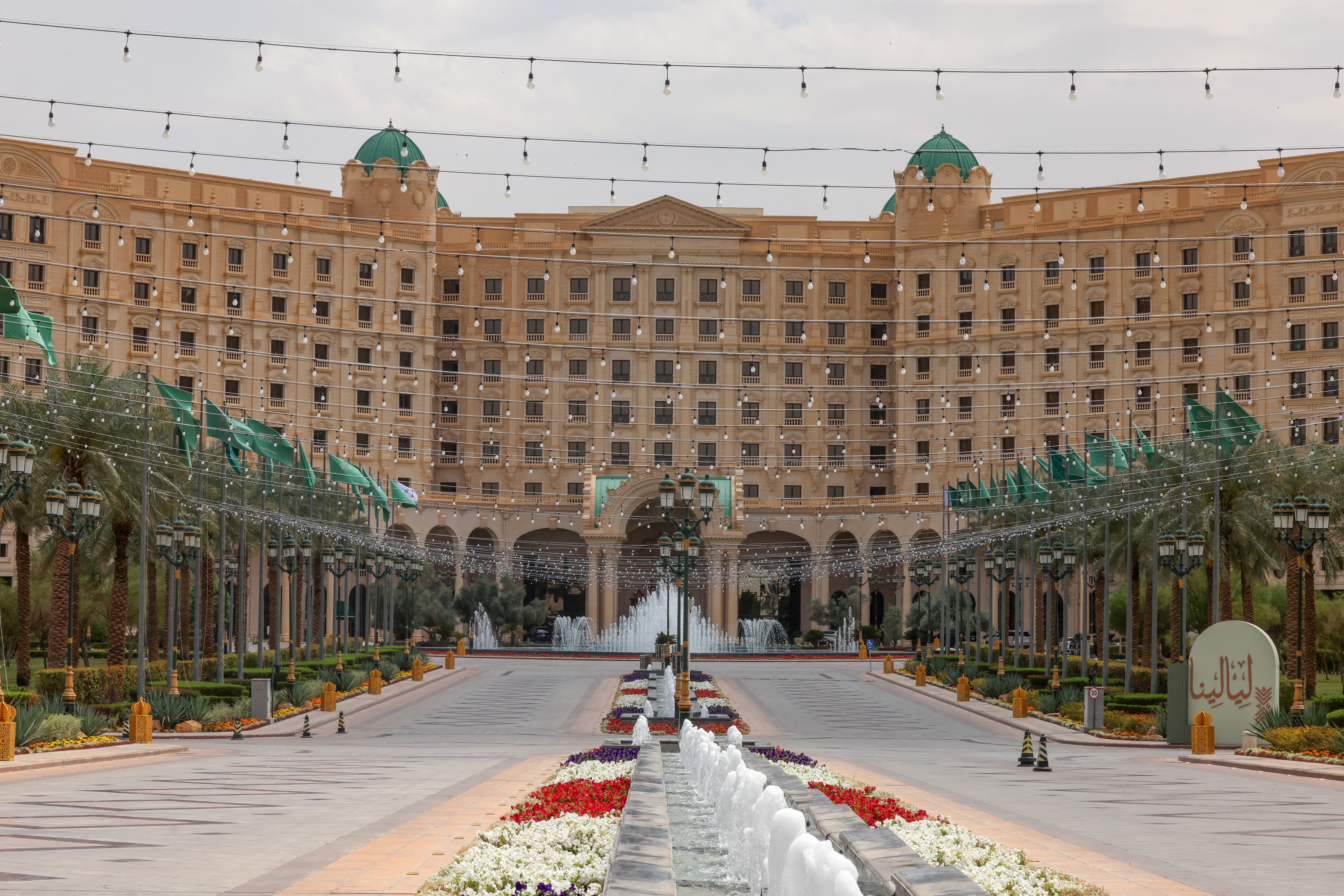
Louis C.K. was one of dozens of prominent comedians who had agreed to play the festival. Most are Americans, and many, like C.K., have had previous encounters with left-wing cancel culture. Kevin Hart, who quit presenting the Oscars over past homophobic jokes. Aziz Ansari, the subject of one of the more unfair #MeToo incidents. Dave Chappelle, whose jokes about trans people prompted protests at Netflix. Plus a whole bunch of independent podcasters whose material would never make it onto Saturday Night Live. Louis C.K.’s co-headliner would be Jimmy Carr, who got into medium trouble in Britain for a joke about killing Gypsies and rather larger trouble for engaging in an offshore tax-avoidance scheme.
What could stand-up comedy look like in a theocracy? Would enough crude jokes about incest, pedophilia, and anal sex really usher in Western liberal democracy to Saudi Arabia? Ahead of the Riyadh event, I had already enjoyed weeks of watching comedians scramble to explain why they had agreed to perform for a brutal authoritarian regime. The podcaster Tim Dillon said on his show that he’d accepted $375,000 to “look the other way,” and, in any case, “there are so many beautiful things that have happened as a result of forced labor.” (He flashed up a picture of the pyramids, which are located in a completely different Arab country, to underline the point.) Saudi Arabia—showing an unexpected grasp of comic timing—promptly canned him from the festival. Dillon said that his manager had told him, “They heard what you said about them having slaves. They didn’t like that.”
Jim Jefferies—an Australian comic best described as a Temu Ricky Gervais—stepped on the same rake. Referring to the killing and dismemberment of the regime critic Jamal Khashoggi in 2018, Jefferies told the podcaster Theo Von, “One reporter was killed by the government. Unfortunate, but not a fucking hill that I’m gonna die on.” People could criticize golfers or soccer players for taking blood riyals, but not comedians. “Basically, we are freedom-of-speech machines being sent over there,” he said.
Sorry, I’m getting an update regarding freedom-of-speech machines: They will not be sent over there. Jefferies disappeared from the lineup, too.
The festival is an outgrowth of Vision 2030, the grand Saudi project to prepare for the kingdom’s post-oil future. The old Saudi brand was “austere theocracy,” but the new one is “fun, fun, fun, but still with beheading.” The Portuguese soccer player Cristiano Ronaldo was lured to a Riyadh team, Al-Nassr, for about $200 million, tax free. The annual Esports World Cup, held in the city this summer, had a prize pool of $70 million. The Six Kings Slam tennis event, held this week in the city and broadcast on Netflix, offers the half-dozen players involved a potential payout of $6 million for two or three matches. A group led by the kingdom’s public investment fund just dropped $55 billion to buy Electronic Arts, the company behind FIFA and other video games. (Jared Kushner was also involved in the deal.) Entities controlled by Saudi leaders also plan to invest up to $1 billion in a Hollywood studio.
The man holding Saudi Arabia’s giant and extremely open checkbook is 40-year-old Mohammed bin Salman, universally known as MBS—a Millennial crown prince for a country where two-thirds of the population is younger than 30. MBS has undoubtedly modernized the country, allowing women to drive and standing down the hated religious police (yay!). But he has done this through a reign of terror in which his opponents have been executed, exiled, or intimidated into silence (oh).
“The comedians on that stage are performing in a gilded cage,” the exiled Saudi satirist Ghanem al-Masarir wrote before the festival, adding, “In MBS’s Saudi Arabia, the punchline is always prison.”
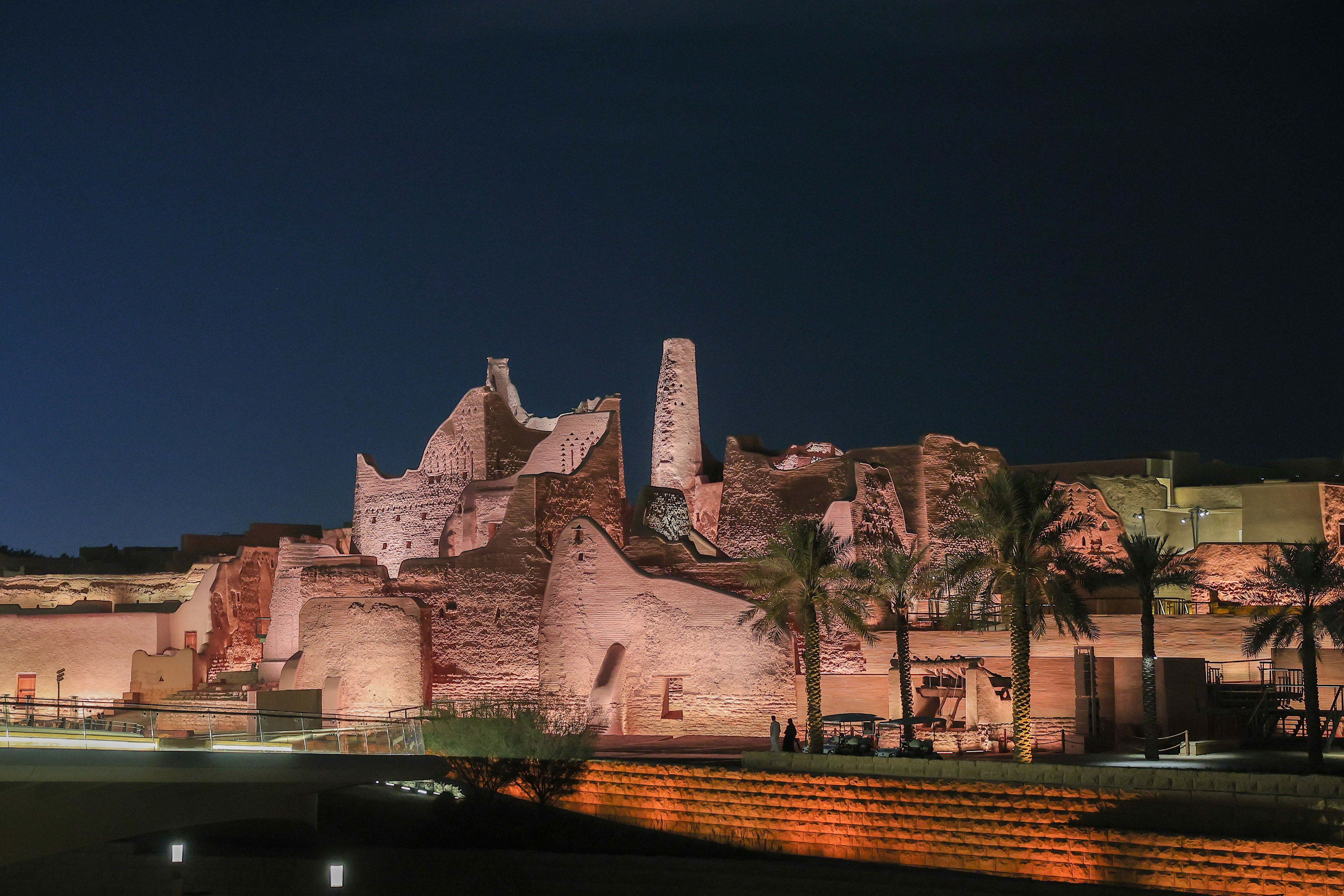
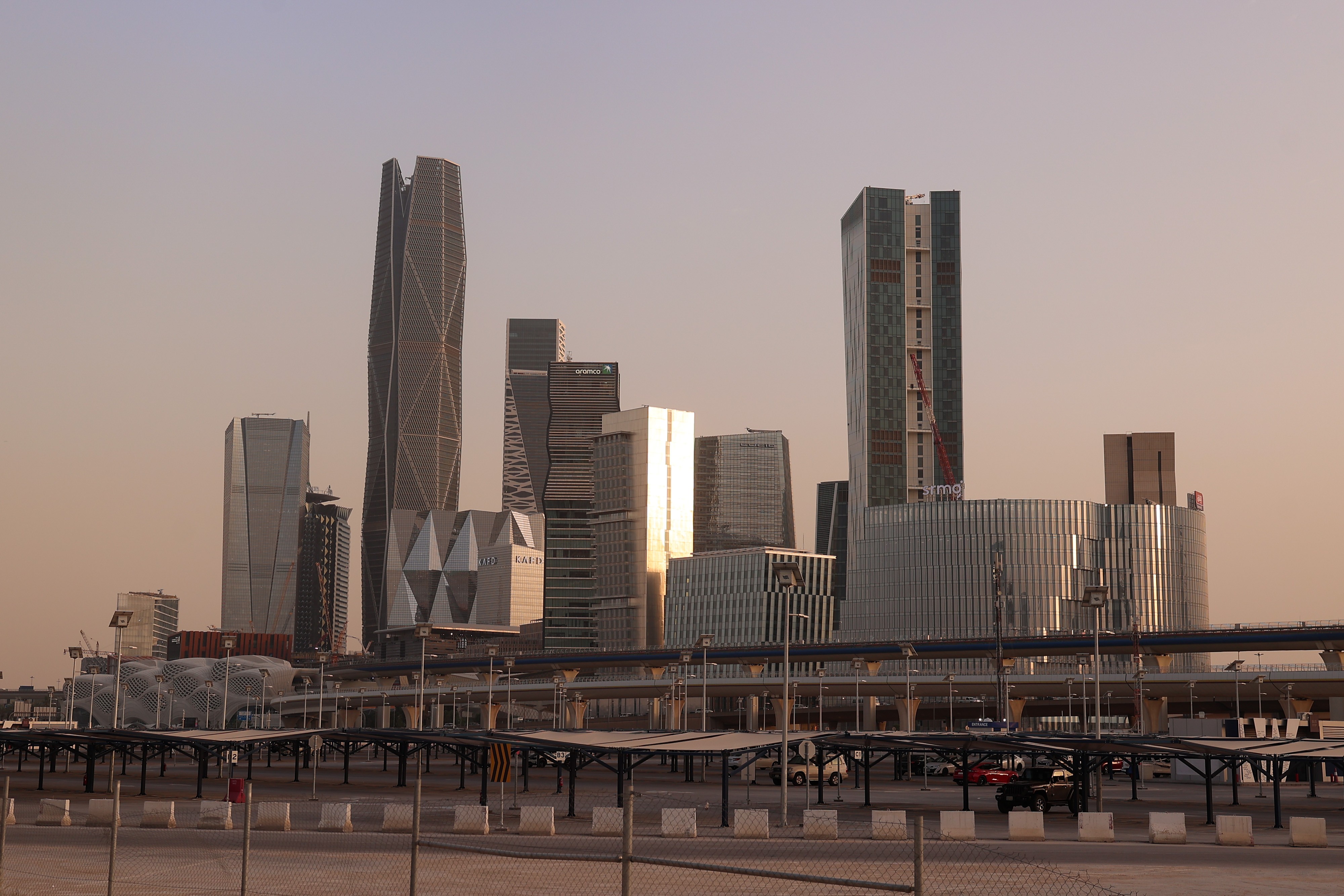
As our car crawled toward the gig, which began at 9:30 p.m. on a Monday night, the temperature had fallen to a moderate 90 degrees, and Riyadh was coming alive. During the day, the city’s shiny new high-end malls and public parks are deserted, as if some lost civilization built a dozen Dolce & Gabbana outlets and then blinked out of existence. After dusk, though, people emerge onto the streets, visiting a cinema—allowed again since 2018—or a restaurant, whether that be a Texas Roadhouse or a satellite location of Spago. American corporations abound: There is a KFC in Mecca, a short walk from the Kaaba, and the first thing you see after immigration at Riyadh airport is a Dunkin’ branch. In nearby Diriyah, a historical site that was the original stronghold of the House of Saud, the fencing outside a massive high-end development carried the legend WHERE TRADITION MEETS MODERN RETAIL. A perfect slogan for what I saw of today’s Saudi Arabia.
The Louis C.K. gig was held in Riyadh’s entertainment district, the Boulevard, a glorified parking lot that is also home to a WWE Experience, an esports arena, and numerous stores selling comic-book figurines. Last year, the district hosted a pop-up Harry Potter World, allowing Saudi Arabians to imagine they were playing Quidditch or drinking nonalcoholic Butterbeer. (It was not that long ago that the Anti-Witchcraft Unit of the Ministry of Interior had banned Harry Potter books from the kingdom.) This year, they’re getting a temporary theme park based on MrBeast, the most popular YouTuber in the world. To promote the comedy festival, the entire place was decked out with expensive faux-neon signs of ungrammatical menace—YOUR LAUGH FROM THIS WAY and HA HA HA!—and statues of the festival’s mascot, a giant smiling microphone with arms and legs. I walked past made-for-Instagram street furniture and a professional photographer taking a picture of a smiling family—dad, two kids, and mom in a full-face veil.
We entered the main venue, ANB Arena, after a hopeful dash across several lanes of traffic—sidewalks and crosswalks are no more reliable here than in America—and a short line to pass through metal detectors and bag up our phones to prevent recording. I had worried about attracting attention by taking notes during the show, and so instead of a reporter’s pad, I had brought a pastel-pink gratitude journal, which I will expense. The crowd was mostly male, just like it is at American comedy nights, and the much-shorter female security line was staffed by brisk women in niqabs. No food or drink was permitted in the arena, not even water. This pained Dante—who, as a good American, believes that hydration is next to godliness. After we took our seats, he observed that this event would be an obvious location for a terrorist atrocity. This really got me in the mood for a night of incest jokes.
The first surprise was that I knew the opening performer—the Irish comedian Andrew Maxwell. “I come from a tiny island full of alcohol,” he told the crowd. “Bahrain.” They loved that one: Bahrain is Saudi’s Cancún. Maxwell was followed by Ibraheem Alkhairallah, a Saudi comedian who is big on Arabic-language YouTube.
Alkhairallah enjoined us all to give a round of applause to the crown prince for being such a great leader of the country, a patriotic innovation that I hope makes it to New York’s Comedy Cellar in the coming Mamdani era. Everyone except Dante and me obliged with apparent enthusiasm. (God, what if this is what we get arrested for, I thought.)
Then it was on to the main attractions. Jimmy Carr bounded onstage, dressed in an immaculate three-piece suit, his face looking freshly ironed. He has a distinctive whooping laugh, like a haunted seagull. About three-quarters of Carr’s usual material is based on the premise that he is a sex offender, and this event was no exception. “I’m a little bit haram,” he said at one point. Then he swerved into a routine about how you can’t say retard and mixed-race any more—you have to say “Harry and Meghan.”
Carr is not an especially political comedian. He does jokes about stopping his girlfriend from snoring thanks to his “noise-canceling fists” and jokes about how his rape fantasy is “someone goes to jail for rape.” Nonetheless, he did push the limits of acceptable speech in Saudi Arabia. After a riff about euthanasia, he added: “We wouldn’t let a dog live like this, and yet people are allowed to go on living in what can only be described as”—here he paused for dramatic effect—“Yemen.” The audience gasped: The recent U.S.-backed Saudi war on Houthi rebels in Yemen was high on the list of things not to talk about in Riyadh.
Later on, Carr asked, “Any lesbians here tonight?” The room’s atmosphere contracted, a sudden tightening. Would anyone out themselves as gay in Saudi Arabia? He held the tension for a moment, then added: “Of course not, it’s a comedy show.” The entire crowd relaxed into laughter. Bloody lesbians! They can’t take a joke.
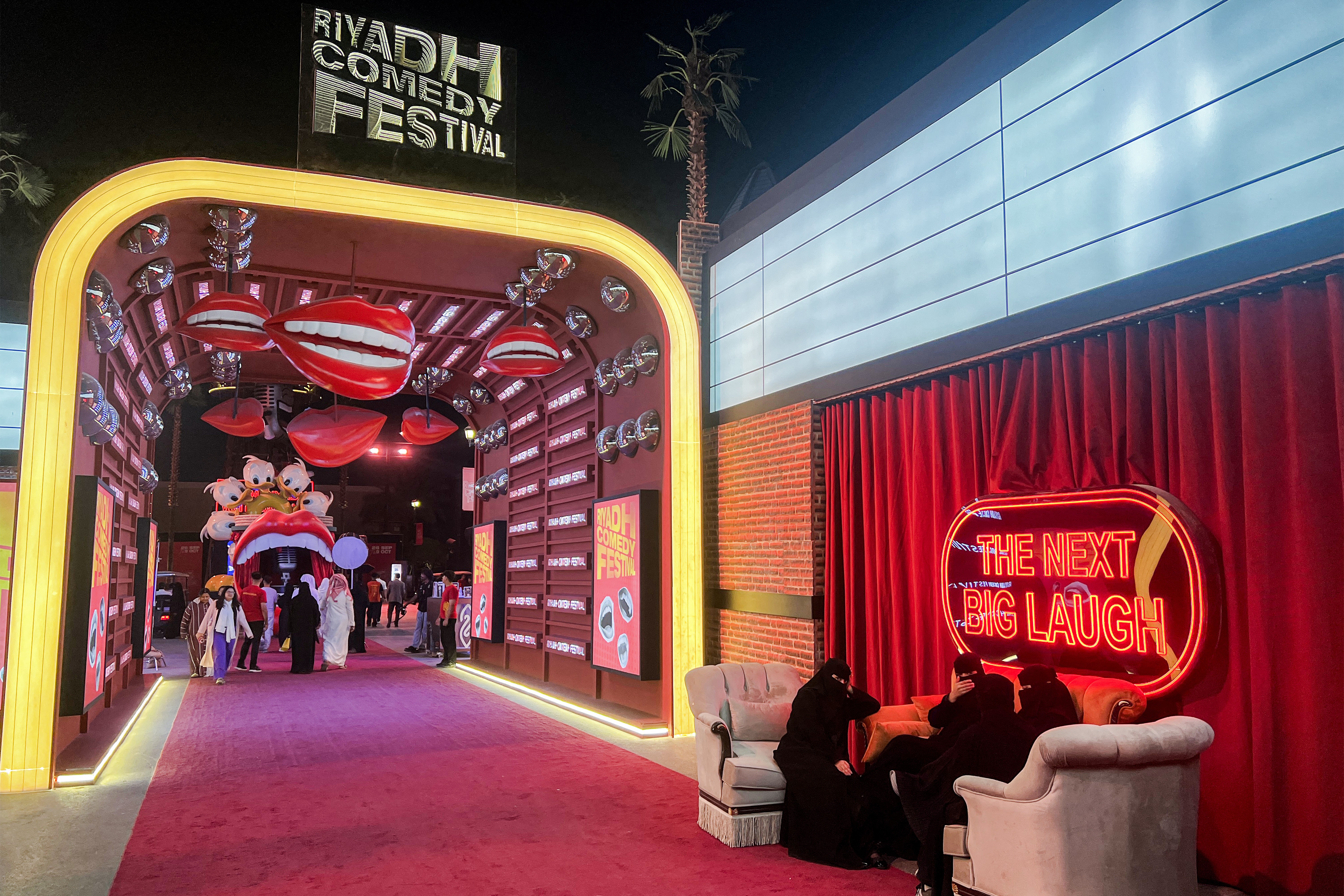
The French have a brilliant phrase—esprit d’escalier, or “staircase wit,” meaning that pang of realization, as you leave a situation, that you could have unloaded an absolute zinger. This is how I feel about missing the opportunity, as Louis C.K. walked on stage in Riyadh to whoops and cheers, to shout: “Get your cock out!”
Maybe it’s better that I didn’t; the British government advises travelers to avoid “behaving in ways the Saudi authorities assess disrupt the public order.” But just imagine the celebrities solemnly promoting an Amnesty petition to free me from detention. The editor of this magazine would even hire me a lawyer.
Louis C.K. was once the titan of thoughtful American comedy—evidence of a strange recent trend of treating comics as public intellectuals, even philosopher kings, rather than entertainers whose success is measured in laughs per minute. He had a sitcom, Louie, that was loosely based on his life, and he had the admiration and envy of his peers. Then, in 2017, The New York Times published one of the most consequential stories of the #MeToo era. Onstage, Louis C.K. was doing highly praised feminist routines about how men were the No. 1 threat to women: “If you’re a guy, try to imagine that you could only date a half-bear, half-lion, and you’re like, ‘Oh, I hope this one’s nice.’” Offstage, he liked to ask female comedians if he could masturbate in front of them. “When you have power over another person, asking them to look at your dick isn’t a question. It’s a predicament for them,” he wrote in his apology statement, adding: “I have spent my long and lucky career talking and saying anything I want. I will now step back and take a long time to listen.”
He took three years, after which he released a special called Sincerely Louis CK, with a self-pitying message: “You all have your thing,” he told the audience. “I don’t know what your thing is. You’re so fucking lucky that I don’t know what your thing is.” The title of his 2021 special, Sorry, can be read as either an apology for his behavior or a frustrated, sarcastic response to the depth of the backlash. In that routine, he joked that COVID had forced everyone to live like him—a hermit. But Sincerely Louis CK won a Grammy, and by 2023, C.K. was back to selling out Madison Square Garden. His new work hasn’t appeared on streaming services, though, and he has continued to sell his specials for $5 or $10 a pop directly from his website. When he appeared on Bill Maher’s show ahead of the Riyadh gig—comedy was “a great way to get in and start talking,” he said—it was his first television appearance in eight years.
For someone like C.K.—or Dave Chappelle, or Kevin Hart—performing in Riyadh doubles as a middle finger to the liberal mainstream. You tried to knock me down, but I’m still making bank. To me, the audience that greeted C.K.’s entrance with a standing ovation in Sorry seemed to be brushing aside those pesky women who had tried to take away their idol from them. At the time, Chappelle had defended C.K. ringing up a woman to jerk off by saying, “Bitch, you don’t know how to hang up a phone?” My position is different: Is it too much to ask people not to ejaculate in professional settings? But, you know, people don’t want to be made to feel bad about things that they like. (Understanding this would help the left win a lot more elections.)
Louis C.K.’s material has always been morbid and self-excoriating, but his set in Riyadh was a real downer. He was old, falling apart, and, worst of all, resigned to dating women his own age. Dante told me it wouldn’t be fair to write here that he bombed, despite the incredible opportunity for bad-taste puns that would provide. But I can’t honestly say the set was rapturously received, either. When C.K. announced he was about to wrap up, a small stream of people decided to head out early to beat the traffic. The instant he stepped off the stage, the remaining crowd stampeded for the exits, rather than hoping for an encore.
The best compliment you could pay the set is that he didn’t appear to have altered it much for local sensibilities. The worst you could say about it is exactly the same thing. He joked about how much he hated jury duty (not a problem in Saudi Arabia), how much he loathed the rain (Saudis would love rain), and how disgusted he was by the elderly woman in his building who wore “little shorts and a tube top” (not relatable for the man on the Riyadh street). Only once did he acknowledge the cultural divide, when introducing a long and particularly bleak section about putting his elderly father in a care home. That scenario might not land in Arab culture, he said, because “you’re compassionate and shit.”
When C.K. launched into the bit on Barely Legal magazine, I thought: Honestly, when was the last time anyone saw a physical porn mag? There are people alive today who are fully legal who haven’t encountered one. By the end of the night, I was, somewhat unexpectedly, annoyed on behalf of the kingdom. You drop six or seven figures to fly in Louis C.K., and he won’t even write some new material? Disrespectful. Send this man to the Ritz-Carlton.
One of the questions I wanted to answer in Riyadh was this: Who is the audience for a Louis C.K. gig in Saudi Arabia? The answer turned out to be a 60–40 mix of locals and expats. The two groups were easy to distinguish, because a lot of Saudi men in the audience wore the ankle-length white thobe and a traditional headdress; most Saudi women, despite the relaxation of the modesty laws, wear niqabs in public, covering their entire face apart from the eyes. (Some have jury-rigged these out of COVID masks alongside a regular headscarf.) The Westerners, by contrast, are in pants and shirts, and sometimes even shorts; the Saudi Tourism Authority asks visitors only to cover their elbows and knees. Within a five-star hotel like the Ritz-Carlton, anything goes. I saw a man who wasn’t Louis C.K. waiting for the elevator in swim trunks and an open bathrobe.
There is another group in Saudi society—although, unsurprisingly, they were not conspicuous at the Louis C.K. show. More than 40 percent of the country’s population are migrant workers from countries such as India, Bangladesh, and the Philippines, flown over to work in hotels and the construction industry. When I arrived at the airport, the immigration line was filled with the occupants of two planes that had just arrived from Dhaka and Mumbai. Every single person I saw was a man.

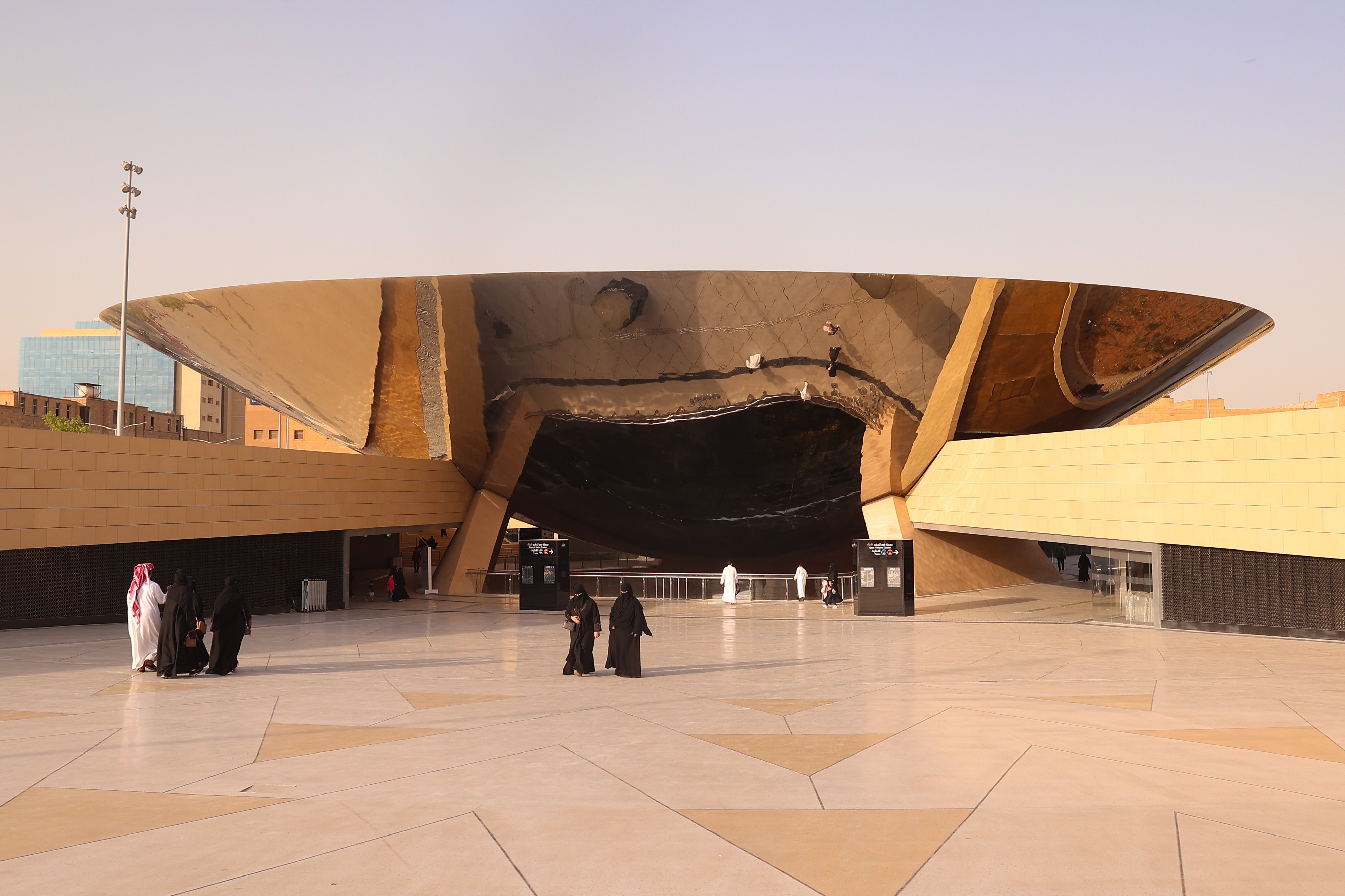
The Riyadh Metro, which opened in December, reflects the tripartite nature of Saudi society. The trains have three carriages: “first class,” which is filled with men in thobes; “family,” home to foreign couples and women delicately lifting their niqab to sip iced coffee; and “single,” disproportionately the preserve of African and South Asian men. The Riyadh Metro is far quieter, cleaner, and more efficient than, say, the New York subway. However, like so much Saudi luxury, it requires a supply of cheap labor last seen in English country houses of the 19th century. As we passed through Al-Urubah station, I watched a man on his hands and knees, polishing the metal rivets on the platform.
The gender balance in Saudi Arabia is deeply skewed: If you include migrants, the population has millions more men than women. This is a worry in a society that has fretted about the radical potential of alienated young men since at least 1979, when a fundamentalist militia stormed Mecca. The British novelist Hilary Mantel spent four years in Jeddah as the wife of a geologist in the 1980s, and found the experience so stifling that she wrote a novel about it. “If you left your husband’s side in the supermarket, some sad man followed you and tried to touch you up in the frozen fish,” she recalled later. “You were probably a prostitute anyway. Most European women were. Male desperation, loneliness and need, the misunderstandings they bred: these hung in the refrigerated air, permeating public spaces like dry ice.” With so much wealth sloshing about, many young Saudi men had little need to work, but they also had few Sharia-approved outlets for leisure. Hard-line clerics forbade musical performances, alcohol, and even all-you-can-eat buffets.
After 9/11, though, the House of Saud was becoming alarmed about what it had indulged—and exported—by giving the clerics such power. Fifteen of the 19 hijackers on 9/11 were Saudi, as was Osama bin Laden, the son of a well-to-do family in the construction business. In 2003, al-Qaeda stopped being other people’s problem, as some of its terrorists carried out a wave of suicide bombings in Riyadh. Potential jihadists have been deradicalized in specialist prisons through intensive lessons in correct Islam—plus money for a dowry and maybe even the gift of a Toyota. “No Saudi official will admit it on the record that the Kingdom’s terrorist problem might boil down to sexual frustration,” Robert Lacey wrote in his book Inside the Kingdom in 2010, “but if a social system bans hot-blooded young men from contact with the opposite sex during their most hot-blooded years, perhaps it is hardly surprising if some of them channel this frustration into violence.” Bored young men in the Gulf once turned to jihad; now they have Jimmy Carr making jokes about dildos. This is called progress.
“I don’t self-censor,” Carr once said, when faced with a backlash against some of his material. “You have to be authentic and say it, and trust that the audience will get that it’s a joke.”
Luckily, there was no need to self-censor in Riyadh, because the government was happy to do that for him. The festival’s big-money offers came with puppet strings attached. In late September, the comedian Atsuko Okatsuka posted the contract that she was offered for a 90-minute gig. She could not “degrade, defame or bring into public disrepute, contempt or scandal, embarrassment or ridicule” either the Kingdom of Saudi Arabia, or “any religion, religious tradition, religious figure or religious practice.” (She declined the invitation.) These conditions were later confirmed by the performer Bill Burr, and by Louis C.K., who told Bill Maher: “They said there’s only two restrictions—their religion and their government. I don’t have jokes about those two things.”
The news of the restrictions prompted a minor civil war among comedians. Suddenly, on podcasts and social media, every comic in America seemed to be discussing why they were going to Riyadh, why they weren’t going to Riyadh, or how they would have gone to Riyadh if only they’d been invited. “From the folks that brought you 9/11,” Marc Maron riffed in a stand-up routine posted to Instagram. “Two weeks of laughter in the desert.” David Cross, who came up alongside Louis C.K. in the 1980s and ’90s, took a different line. “All of your bitching about ‘cancel culture’ and ‘freedom of speech’ and all that shit? Done,” he wrote in a statement. “You don’t get to talk about it ever again. By now we’ve all seen the contract you had to sign.” (“I’m glad these guys brought this stuff up,” Louis C.K. told Maher. He had “mixed feelings” about the festival, and “struggled about going once I started hearing what everyone was saying.”) Dave Chappelle went, gave no explanation, and said on stage in Riyadh that he felt freer to speak than he does in America. Jessica Kirson also went, regretted it, and said she donated the fee to a human-rights charity.
One of the main points of contention was that this wasn’t just a festival in Saudi Arabia; this was performing at the pleasure of the Saudi state. The General Entertainment Authority—essentially the government’s Ministry of State-Mandated Fun and Laughter—organized the festival and is overseen by Turki al-Sheikh, a close ally of MBS. (They bonded over their shared love of video games.) Like MBS himself, al-Sheikh is a zealous modernizer with zero tolerance for criticism; some of his critics have reportedly been locked up in jail for unflattering tweets.
So why take his money? The most common defense was not, as you might expect, the Jim Jefferies one: all that hokum about comedians as emissaries of peace and brotherly love. No, the biggest rationalization was that America does bad shit too. Dillon, for example, cited U.S. support for Israel’s war in Gaza as a reason not to single out Saudi Arabia for criticism. Some comics’ lack of belief in America as a moral force for good was accompanied by an ambient nihilism. On the podcast 2 Bears, 1 Cave, Stavros Halkias and Chris Distefano agonized over whether to accept invitations to perform. “All entertainment money is fucking blood money,” said Halkias. He didn’t go; Distefano did.
And so did Bill Burr. When he returned from Riyadh, Burr gushed about the experience on his podcast, Monday Morning. “My whole fucking idea of Saudi Arabia is what I’ve seen on the news,” he said. “I literally think I’m going to fucking land, you know, and everybody’s going to be screaming ‘Death to America!’ and they’re going to have like fucking machetes and want to like chop my head off, right?” However, “everybody’s just regular—like, shooting the shit.” (His next special should be called Bill Burr’s Low Bar.) How could Riyadh be an ethically troubling destination, he added, when it was full of American food brands—Starbucks, McDonald’s, Chili’s? Nowhere with a Dunkin’ could be that bad, surely. He might not have known about Deera Square, a short drive from ANB Arena. Known locally as Chop-Chop Square, it’s the traditional location of public beheadings in Riyadh. Although the Saudis executed a record 345 people last year, public beheadings are now considered declassé, having been ruined by the Islamic State. I’m sure Burr could do something funny with that.
Burr’s words reflect the bland incuriosity that accrues with wealth. As I ate dinner one night at the Ritz-Carlton, in a Chinese restaurant overlooking the indoor swimming pool, I reflected that the promise of a five-star hotel is insulation, a cocoon against the outside world. A rich person—a successful comedian, say—could glide from the business-class lounge to the front of the aircraft to an air-conditioned limo to a luxury hotel where your dinner is interrupted by five different people asking if everything is okay. Live enough days like this, and the whole world becomes your bellhop. No wonder these guys like Saudi Arabia. The way that daily life bends around rich people is that little bit more obvious here.
After several days of backlash to his naive musings, Burr returned with another thought: His critics, he told Conan O’Brien, were “sanctimonious cunts.” For me, the fairer complaint is that Western detractors were thinking about the festival the wrong way. They deemed it a PR disaster for Saudi Arabia because it exposed the regime’s hypocrisy about free speech and the performers’ cynicism. On the contrary, the festival said to middle-class Saudis: Do you need the vote if you have lots of money and Louis C.K.? That’s a trade-off that even many Americans would accept.
Burr also told O’Brien something that I fear is correct: that American society was moving toward Saudi illiberalism by “fucking grabbing moms and dads and sticking them in a van for making illegally made fucking tacos.” This, to me, was the greatest irony of the Riyadh Comedy Festival. With its Cheesecake Factory outlets and newfound interest in comedy, Saudi Arabia is becoming more American—just as America is becoming more Saudi. In the U.S., the government is stifling the media, due process is being eroded, the ruler’s relatives are sent on quasi-governmental missions, and businessmen make overt displays of loyalty. Donald Trump’s White House has given up lecturing other countries on their human-rights records and adopted a purely transactional approach to foreign affairs. Comedians are just following his lead.
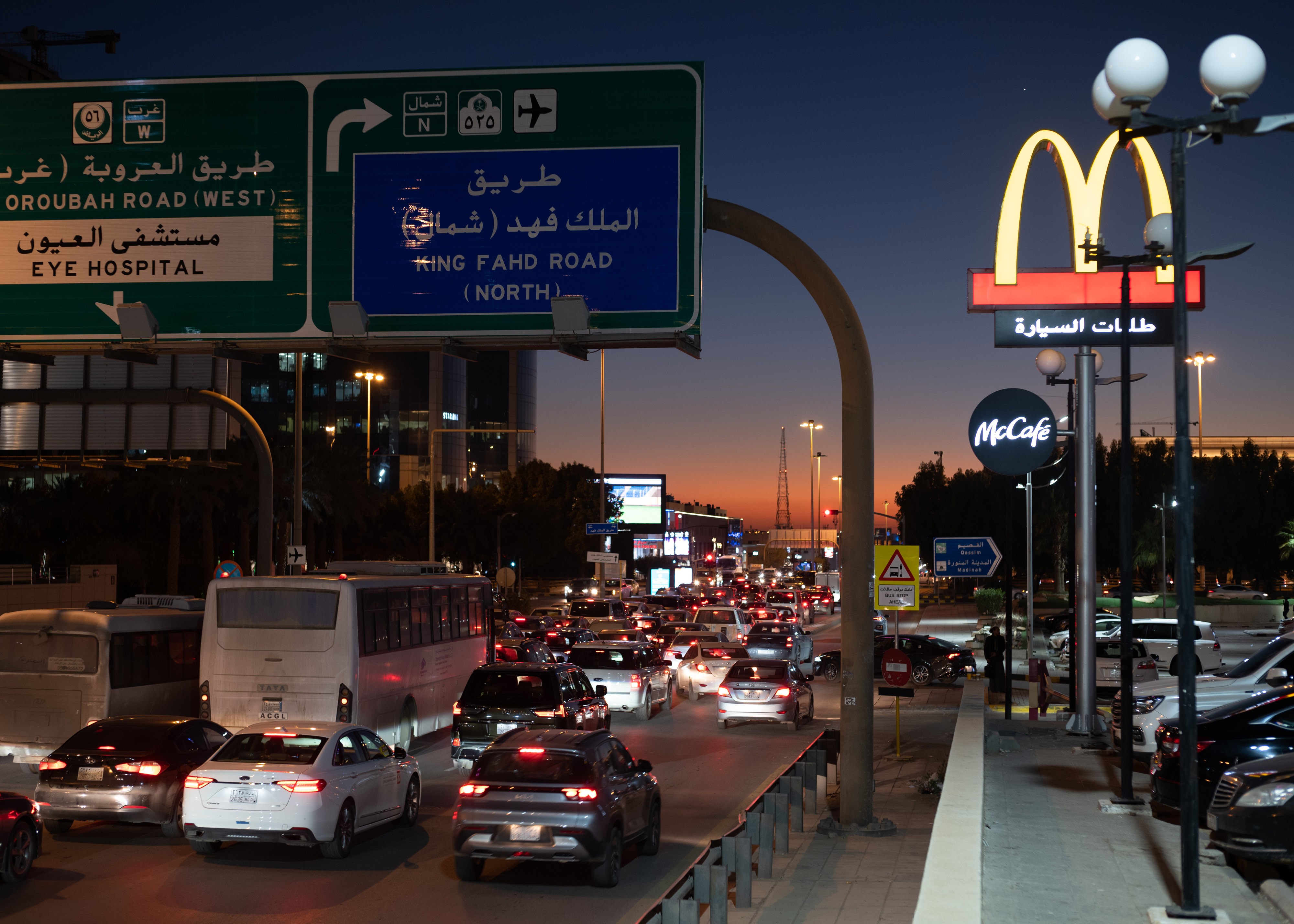
On the plane home to London I spotted Andrew Maxwell, who had warmed up for Carr and C.K. He and I have appeared on British radio together, and he was more than happy to talk about why he had taken the Riyadh gig. “I grew up in a de facto theocracy,” he told me, referring to Ireland. “You couldn’t get divorced. Abortion was illegal. Being gay was illegal. Yes, it was a democracy, but the church was everywhere. And in 10, 15 years, when I was growing up, it all changed.” He hoped that Saudi Arabia was undergoing a similar process. The country was “speedrunning” toward modernity, he said, whereas the West had taken 500 years to get there, with a lot of bloodshed.
And the Saudis are hardly the only ones limiting what comedians can say. “That list of restrictions? That is no different from a corporate event,” he told me. “Every single famous comedian you’ve ever heard of has done private events. I’m not remotely laissez-faire about freedom of speech, but you’ve got to start where people are. We tried top-down state-building in the Middle East, and it failed.” I told him this was the most sincere defense I’d heard for participating in the festival. “It’s not a defense. It’s a fact,” he said without rancor.
What about taking money from the Saudi government? “You and I have worked for the BBC,” he replied—Britain’s state-funded broadcaster. I countered that the BBC had not, to the best of my knowledge, dismembered anyone. Things weren’t the same in the Gulf states, he said. “You don’t retire like Tony Blair and run a fucking institute. It’s like Game of Thrones. You rule or you die.”
The night before the big event, Maxwell had gone with Louis C.K. to the Comedy Pod, a 180-seater stand-up club in Riyadh. Both men did their sets (in English) to an audience of local comics, who started applauding before C.K. had even said a word. “Louis got a standing ovation on, and another off,” Maxwell said. The atmosphere reminded him of the Dublin club where he came up in the 1990s—a small space where young comics gathered to workshop material and check out the competition.
Louis C.K. referenced the Riyadh club onstage, at the very end of his set, telling the audience what a great time he’d had, and asked them to applaud the Saudi comedians who perform there. The thing was, Louis C.K. said, comedy was the same everywhere, and so it could bring people together. Even though Riyadh’s comics were performing in Arabic, he went on, “it was all the same jokes. Your wife’s a pain in the ass. You can tell.”
*Illustration sources: Dante Ramos; Fayez Nuraldine / AFP / Getty; Theo Wargo / Getty.
The post How Many Comedians Does It Take to Change a Country? appeared first on The Atlantic.




